Leadership Journey: Reflective Report on Leadership Theories & Skills
VerifiedAdded on 2023/03/30
|22
|4217
|196
Report
AI Summary
This report explores the concept of reflection as a learning tool within organizations and its connection to various leadership theories and styles. It highlights the impact of class activities on self-understanding and leadership capacity. The coursework delves into different leadership theories, including trait, behavioral, situational, cognitive, transformational, and modern approaches like empowering, ethical, authentic, and servant leadership. Experiences that have shaped the author's thoughts and triggered leadership skills are also discussed, providing a comprehensive overview of personal and academic growth in the context of leadership.
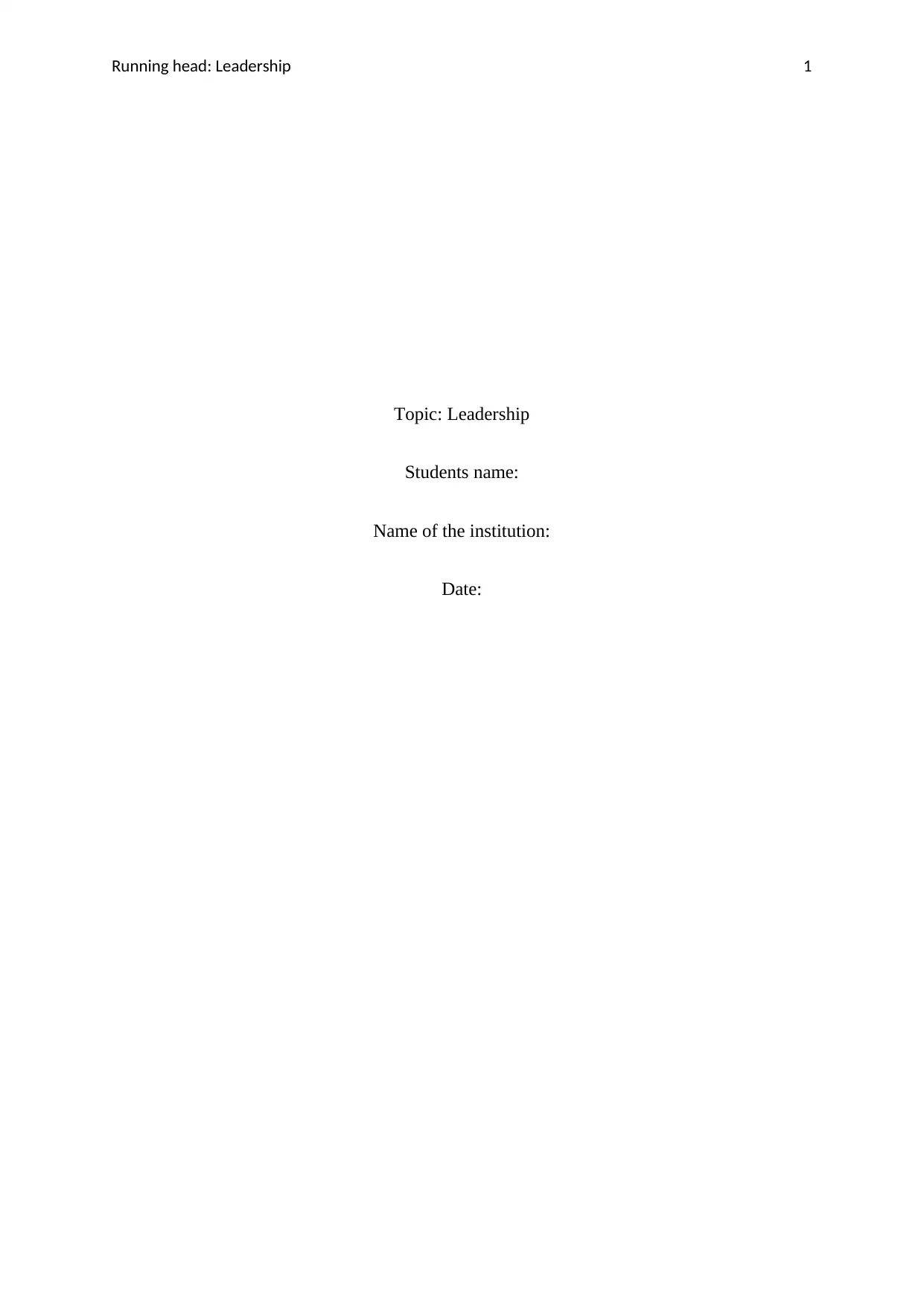
Running head: Leadership 1
Topic: Leadership
Students name:
Name of the institution:
Date:
Topic: Leadership
Students name:
Name of the institution:
Date:
Paraphrase This Document
Need a fresh take? Get an instant paraphrase of this document with our AI Paraphraser
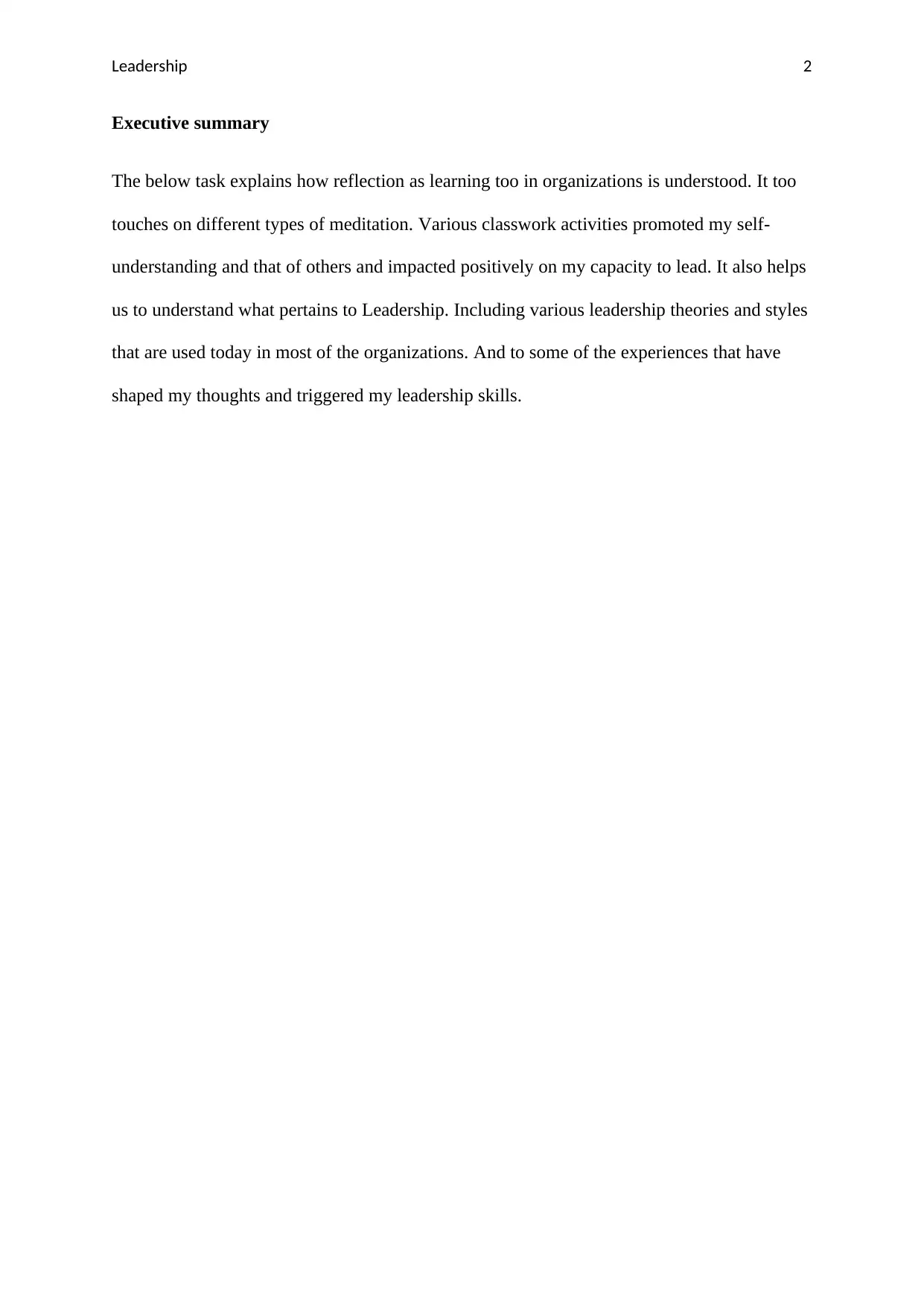
Leadership 2
Executive summary
The below task explains how reflection as learning too in organizations is understood. It too
touches on different types of meditation. Various classwork activities promoted my self-
understanding and that of others and impacted positively on my capacity to lead. It also helps
us to understand what pertains to Leadership. Including various leadership theories and styles
that are used today in most of the organizations. And to some of the experiences that have
shaped my thoughts and triggered my leadership skills.
Executive summary
The below task explains how reflection as learning too in organizations is understood. It too
touches on different types of meditation. Various classwork activities promoted my self-
understanding and that of others and impacted positively on my capacity to lead. It also helps
us to understand what pertains to Leadership. Including various leadership theories and styles
that are used today in most of the organizations. And to some of the experiences that have
shaped my thoughts and triggered my leadership skills.
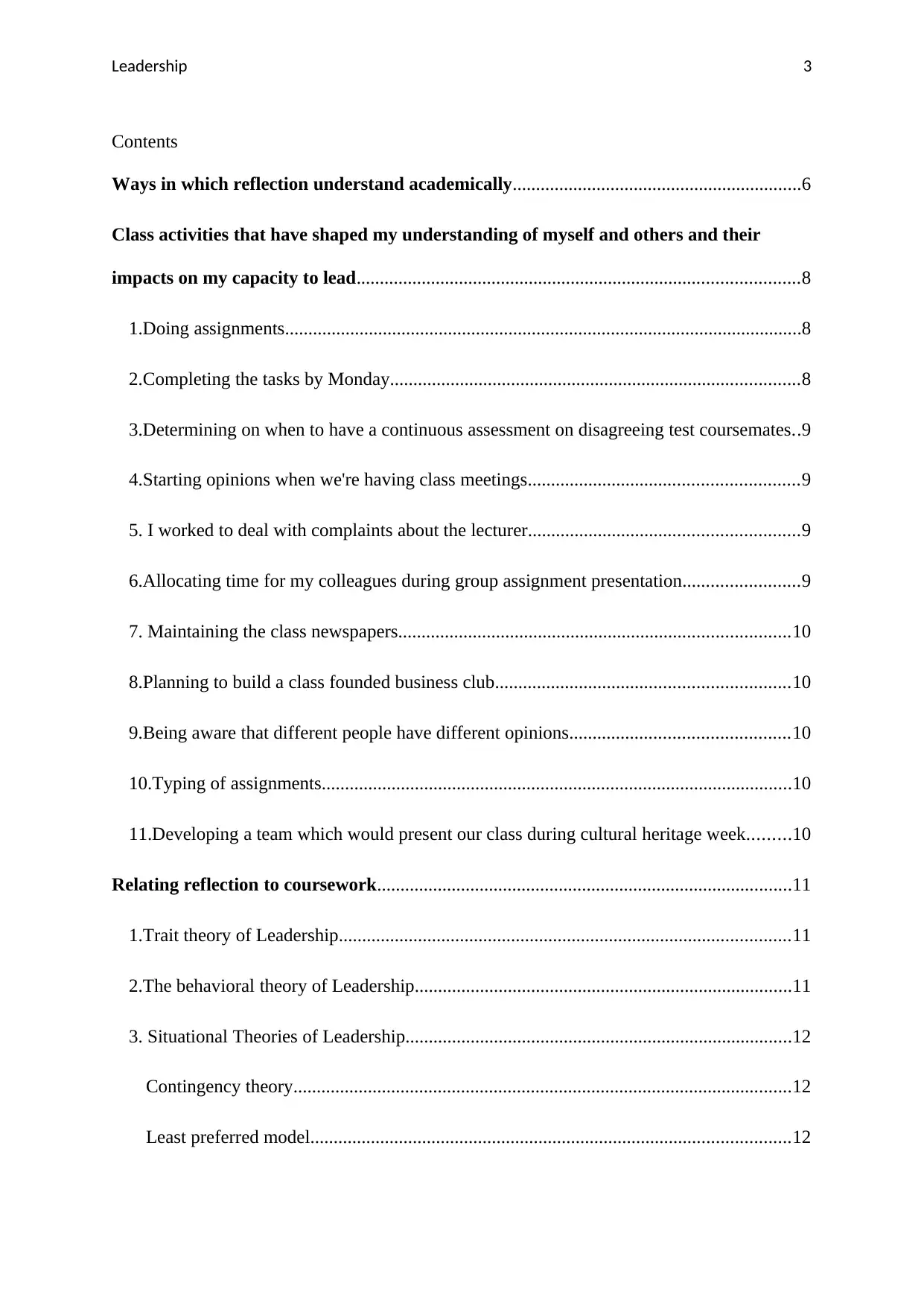
Leadership 3
Contents
Ways in which reflection understand academically..............................................................6
Class activities that have shaped my understanding of myself and others and their
impacts on my capacity to lead...............................................................................................8
1.Doing assignments...............................................................................................................8
2.Completing the tasks by Monday........................................................................................8
3.Determining on when to have a continuous assessment on disagreeing test coursemates..9
4.Starting opinions when we're having class meetings..........................................................9
5. I worked to deal with complaints about the lecturer..........................................................9
6.Allocating time for my colleagues during group assignment presentation.........................9
7. Maintaining the class newspapers....................................................................................10
8.Planning to build a class founded business club...............................................................10
9.Being aware that different people have different opinions...............................................10
10.Typing of assignments.....................................................................................................10
11.Developing a team which would present our class during cultural heritage week.........10
Relating reflection to coursework.........................................................................................11
1.Trait theory of Leadership.................................................................................................11
2.The behavioral theory of Leadership.................................................................................11
3. Situational Theories of Leadership...................................................................................12
Contingency theory...........................................................................................................12
Least preferred model.......................................................................................................12
Contents
Ways in which reflection understand academically..............................................................6
Class activities that have shaped my understanding of myself and others and their
impacts on my capacity to lead...............................................................................................8
1.Doing assignments...............................................................................................................8
2.Completing the tasks by Monday........................................................................................8
3.Determining on when to have a continuous assessment on disagreeing test coursemates..9
4.Starting opinions when we're having class meetings..........................................................9
5. I worked to deal with complaints about the lecturer..........................................................9
6.Allocating time for my colleagues during group assignment presentation.........................9
7. Maintaining the class newspapers....................................................................................10
8.Planning to build a class founded business club...............................................................10
9.Being aware that different people have different opinions...............................................10
10.Typing of assignments.....................................................................................................10
11.Developing a team which would present our class during cultural heritage week.........10
Relating reflection to coursework.........................................................................................11
1.Trait theory of Leadership.................................................................................................11
2.The behavioral theory of Leadership.................................................................................11
3. Situational Theories of Leadership...................................................................................12
Contingency theory...........................................................................................................12
Least preferred model.......................................................................................................12
⊘ This is a preview!⊘
Do you want full access?
Subscribe today to unlock all pages.

Trusted by 1+ million students worldwide
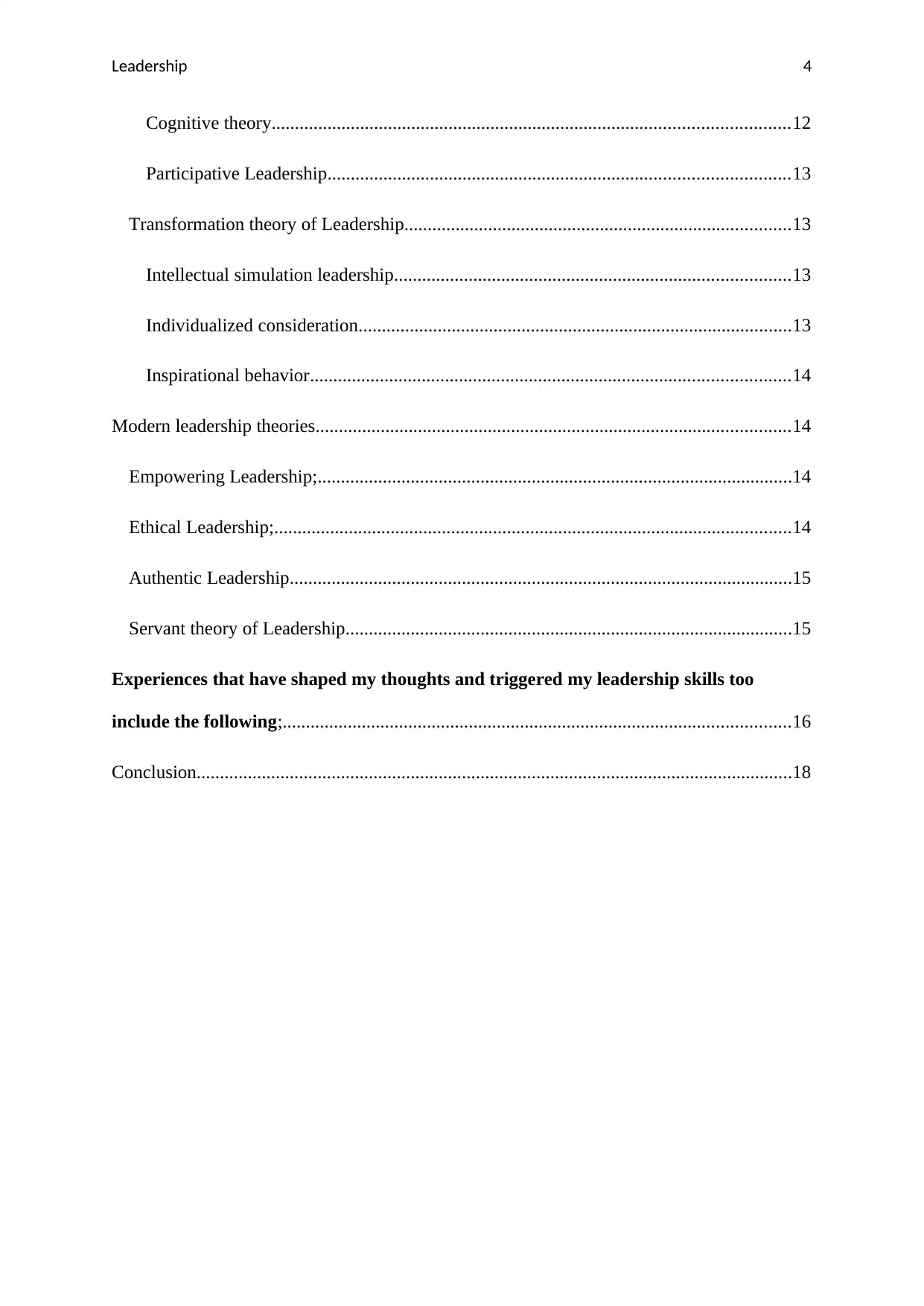
Leadership 4
Cognitive theory...............................................................................................................12
Participative Leadership...................................................................................................13
Transformation theory of Leadership...................................................................................13
Intellectual simulation leadership.....................................................................................13
Individualized consideration.............................................................................................13
Inspirational behavior.......................................................................................................14
Modern leadership theories......................................................................................................14
Empowering Leadership;......................................................................................................14
Ethical Leadership;...............................................................................................................14
Authentic Leadership............................................................................................................15
Servant theory of Leadership................................................................................................15
Experiences that have shaped my thoughts and triggered my leadership skills too
include the following;.............................................................................................................16
Conclusion................................................................................................................................18
Cognitive theory...............................................................................................................12
Participative Leadership...................................................................................................13
Transformation theory of Leadership...................................................................................13
Intellectual simulation leadership.....................................................................................13
Individualized consideration.............................................................................................13
Inspirational behavior.......................................................................................................14
Modern leadership theories......................................................................................................14
Empowering Leadership;......................................................................................................14
Ethical Leadership;...............................................................................................................14
Authentic Leadership............................................................................................................15
Servant theory of Leadership................................................................................................15
Experiences that have shaped my thoughts and triggered my leadership skills too
include the following;.............................................................................................................16
Conclusion................................................................................................................................18
Paraphrase This Document
Need a fresh take? Get an instant paraphrase of this document with our AI Paraphraser
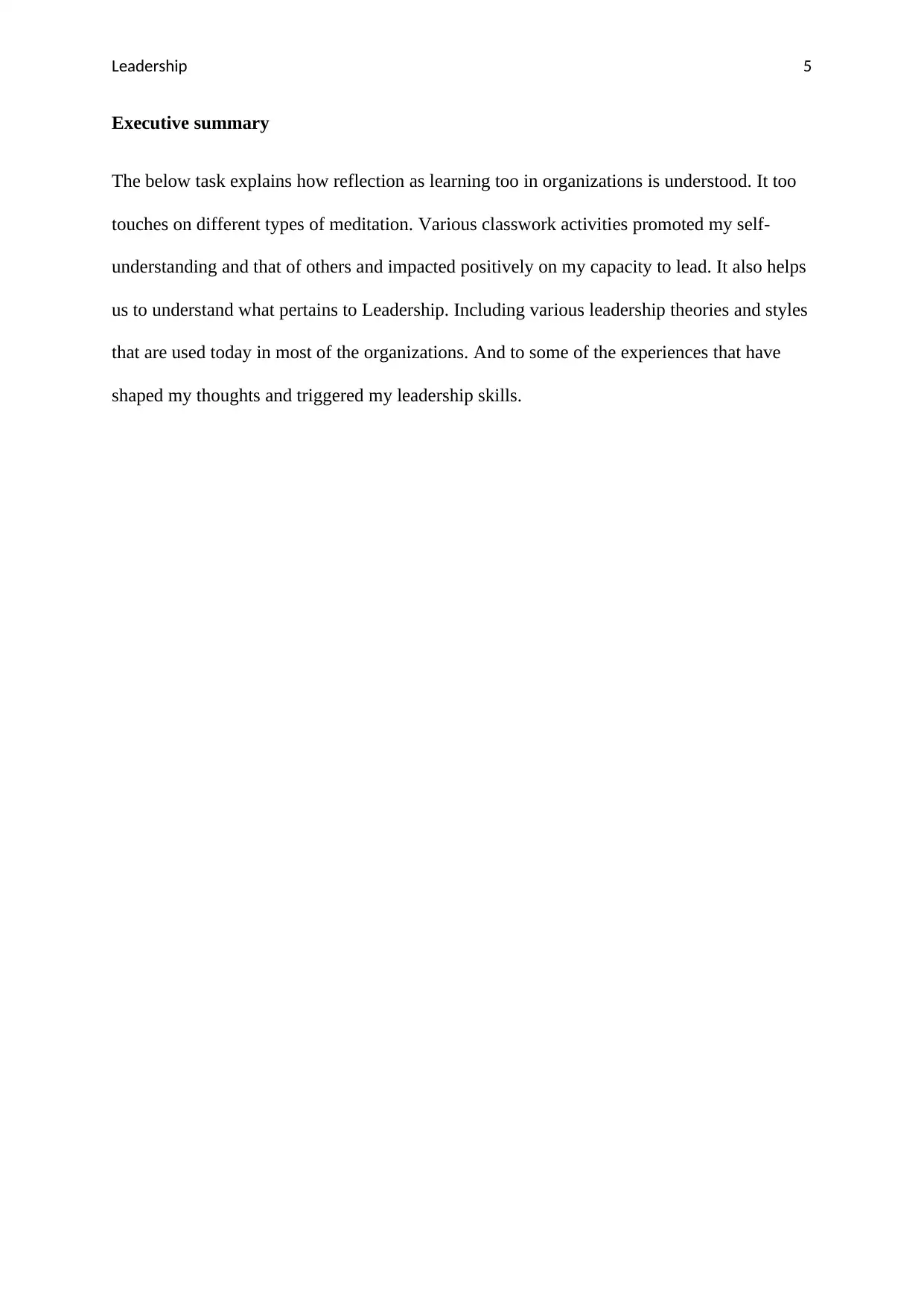
Leadership 5
Executive summary
The below task explains how reflection as learning too in organizations is understood. It too
touches on different types of meditation. Various classwork activities promoted my self-
understanding and that of others and impacted positively on my capacity to lead. It also helps
us to understand what pertains to Leadership. Including various leadership theories and styles
that are used today in most of the organizations. And to some of the experiences that have
shaped my thoughts and triggered my leadership skills.
Executive summary
The below task explains how reflection as learning too in organizations is understood. It too
touches on different types of meditation. Various classwork activities promoted my self-
understanding and that of others and impacted positively on my capacity to lead. It also helps
us to understand what pertains to Leadership. Including various leadership theories and styles
that are used today in most of the organizations. And to some of the experiences that have
shaped my thoughts and triggered my leadership skills.

Leadership 6
⊘ This is a preview!⊘
Do you want full access?
Subscribe today to unlock all pages.

Trusted by 1+ million students worldwide
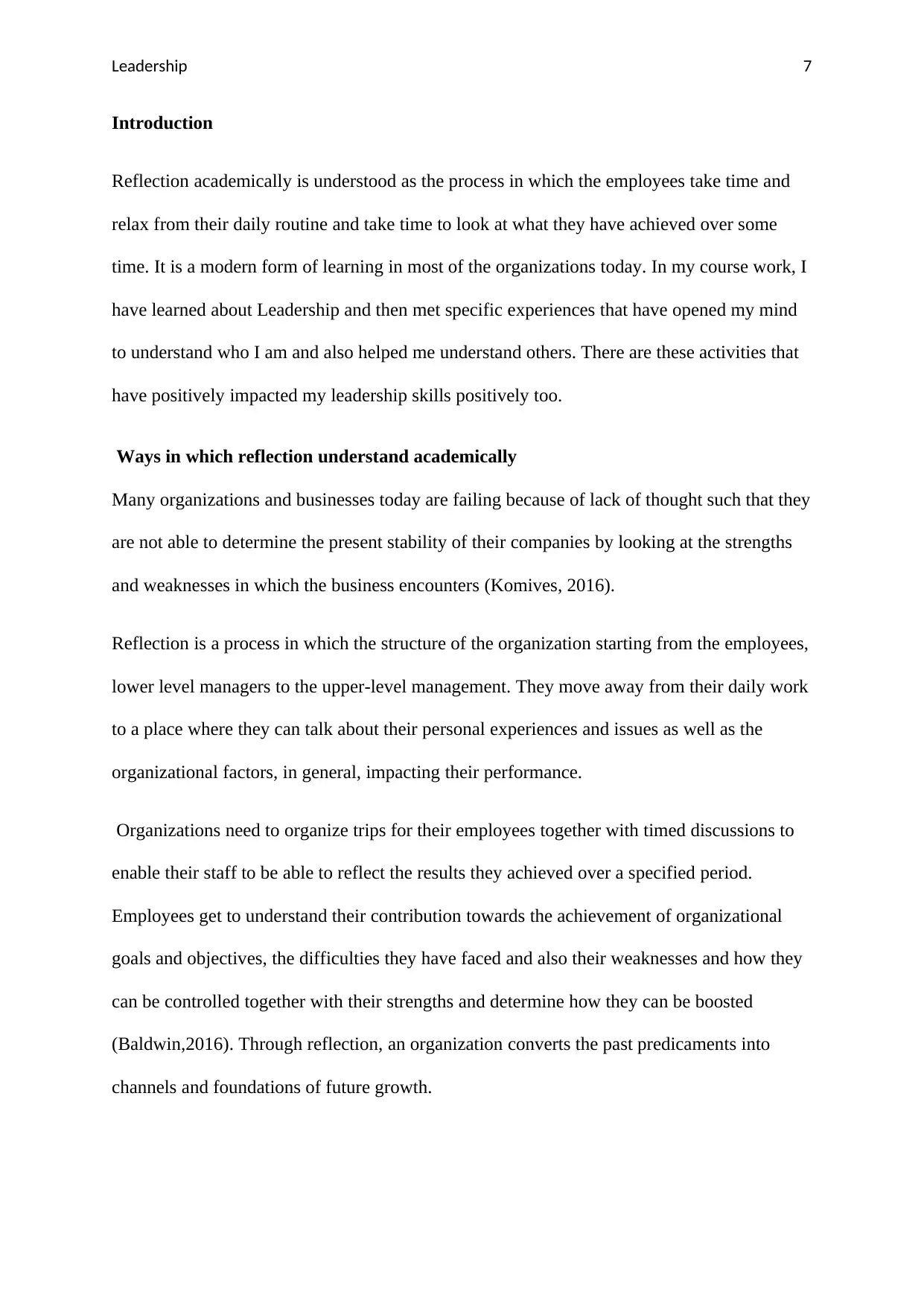
Leadership 7
Introduction
Reflection academically is understood as the process in which the employees take time and
relax from their daily routine and take time to look at what they have achieved over some
time. It is a modern form of learning in most of the organizations today. In my course work, I
have learned about Leadership and then met specific experiences that have opened my mind
to understand who I am and also helped me understand others. There are these activities that
have positively impacted my leadership skills positively too.
Ways in which reflection understand academically
Many organizations and businesses today are failing because of lack of thought such that they
are not able to determine the present stability of their companies by looking at the strengths
and weaknesses in which the business encounters (Komives, 2016).
Reflection is a process in which the structure of the organization starting from the employees,
lower level managers to the upper-level management. They move away from their daily work
to a place where they can talk about their personal experiences and issues as well as the
organizational factors, in general, impacting their performance.
Organizations need to organize trips for their employees together with timed discussions to
enable their staff to be able to reflect the results they achieved over a specified period.
Employees get to understand their contribution towards the achievement of organizational
goals and objectives, the difficulties they have faced and also their weaknesses and how they
can be controlled together with their strengths and determine how they can be boosted
(Baldwin,2016). Through reflection, an organization converts the past predicaments into
channels and foundations of future growth.
Introduction
Reflection academically is understood as the process in which the employees take time and
relax from their daily routine and take time to look at what they have achieved over some
time. It is a modern form of learning in most of the organizations today. In my course work, I
have learned about Leadership and then met specific experiences that have opened my mind
to understand who I am and also helped me understand others. There are these activities that
have positively impacted my leadership skills positively too.
Ways in which reflection understand academically
Many organizations and businesses today are failing because of lack of thought such that they
are not able to determine the present stability of their companies by looking at the strengths
and weaknesses in which the business encounters (Komives, 2016).
Reflection is a process in which the structure of the organization starting from the employees,
lower level managers to the upper-level management. They move away from their daily work
to a place where they can talk about their personal experiences and issues as well as the
organizational factors, in general, impacting their performance.
Organizations need to organize trips for their employees together with timed discussions to
enable their staff to be able to reflect the results they achieved over a specified period.
Employees get to understand their contribution towards the achievement of organizational
goals and objectives, the difficulties they have faced and also their weaknesses and how they
can be controlled together with their strengths and determine how they can be boosted
(Baldwin,2016). Through reflection, an organization converts the past predicaments into
channels and foundations of future growth.
Paraphrase This Document
Need a fresh take? Get an instant paraphrase of this document with our AI Paraphraser
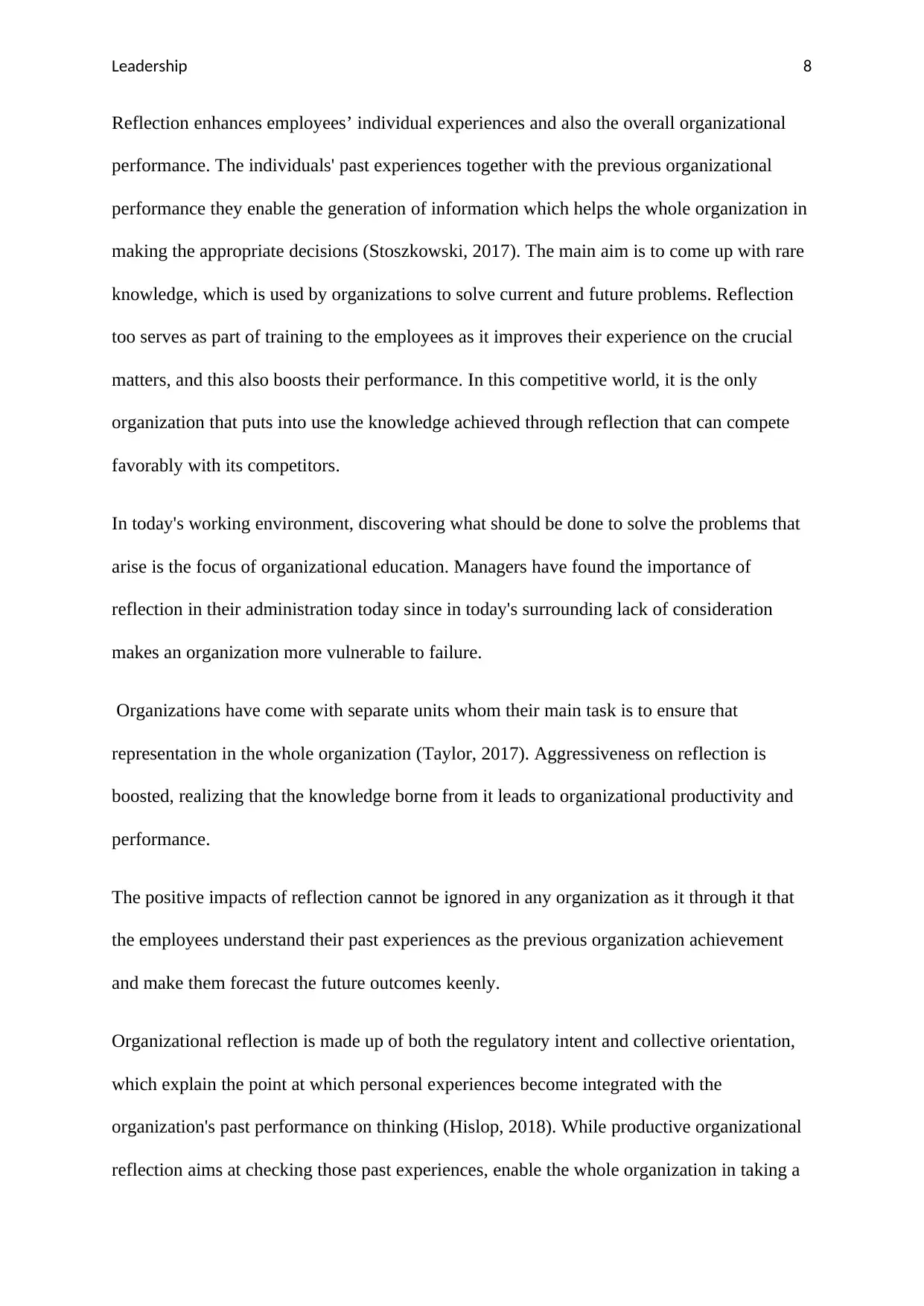
Leadership 8
Reflection enhances employees’ individual experiences and also the overall organizational
performance. The individuals' past experiences together with the previous organizational
performance they enable the generation of information which helps the whole organization in
making the appropriate decisions (Stoszkowski, 2017). The main aim is to come up with rare
knowledge, which is used by organizations to solve current and future problems. Reflection
too serves as part of training to the employees as it improves their experience on the crucial
matters, and this also boosts their performance. In this competitive world, it is the only
organization that puts into use the knowledge achieved through reflection that can compete
favorably with its competitors.
In today's working environment, discovering what should be done to solve the problems that
arise is the focus of organizational education. Managers have found the importance of
reflection in their administration today since in today's surrounding lack of consideration
makes an organization more vulnerable to failure.
Organizations have come with separate units whom their main task is to ensure that
representation in the whole organization (Taylor, 2017). Aggressiveness on reflection is
boosted, realizing that the knowledge borne from it leads to organizational productivity and
performance.
The positive impacts of reflection cannot be ignored in any organization as it through it that
the employees understand their past experiences as the previous organization achievement
and make them forecast the future outcomes keenly.
Organizational reflection is made up of both the regulatory intent and collective orientation,
which explain the point at which personal experiences become integrated with the
organization's past performance on thinking (Hislop, 2018). While productive organizational
reflection aims at checking those past experiences, enable the whole organization in taking a
Reflection enhances employees’ individual experiences and also the overall organizational
performance. The individuals' past experiences together with the previous organizational
performance they enable the generation of information which helps the whole organization in
making the appropriate decisions (Stoszkowski, 2017). The main aim is to come up with rare
knowledge, which is used by organizations to solve current and future problems. Reflection
too serves as part of training to the employees as it improves their experience on the crucial
matters, and this also boosts their performance. In this competitive world, it is the only
organization that puts into use the knowledge achieved through reflection that can compete
favorably with its competitors.
In today's working environment, discovering what should be done to solve the problems that
arise is the focus of organizational education. Managers have found the importance of
reflection in their administration today since in today's surrounding lack of consideration
makes an organization more vulnerable to failure.
Organizations have come with separate units whom their main task is to ensure that
representation in the whole organization (Taylor, 2017). Aggressiveness on reflection is
boosted, realizing that the knowledge borne from it leads to organizational productivity and
performance.
The positive impacts of reflection cannot be ignored in any organization as it through it that
the employees understand their past experiences as the previous organization achievement
and make them forecast the future outcomes keenly.
Organizational reflection is made up of both the regulatory intent and collective orientation,
which explain the point at which personal experiences become integrated with the
organization's past performance on thinking (Hislop, 2018). While productive organizational
reflection aims at checking those past experiences, enable the whole organization in taking a
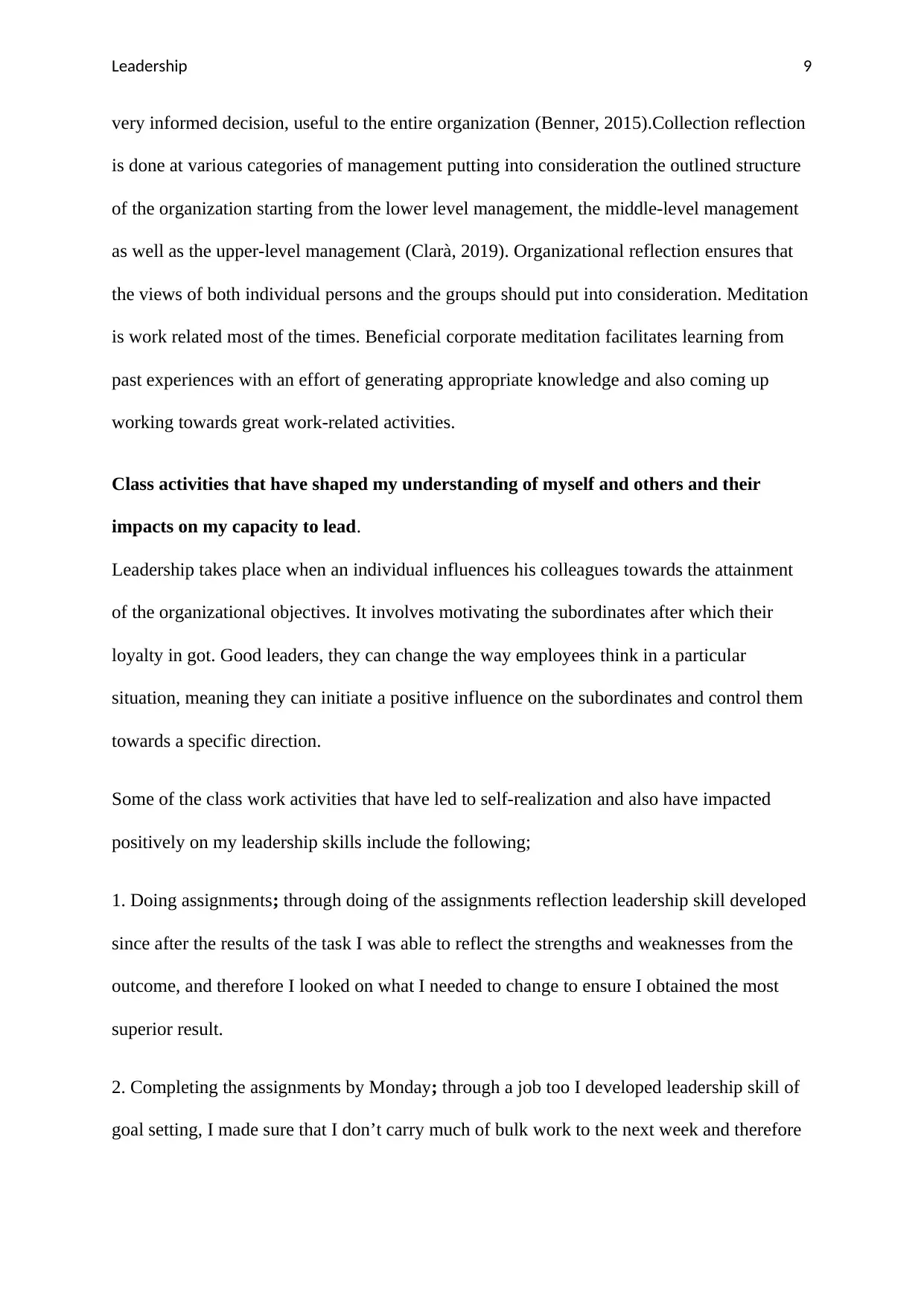
Leadership 9
very informed decision, useful to the entire organization (Benner, 2015).Collection reflection
is done at various categories of management putting into consideration the outlined structure
of the organization starting from the lower level management, the middle-level management
as well as the upper-level management (Clarà, 2019). Organizational reflection ensures that
the views of both individual persons and the groups should put into consideration. Meditation
is work related most of the times. Beneficial corporate meditation facilitates learning from
past experiences with an effort of generating appropriate knowledge and also coming up
working towards great work-related activities.
Class activities that have shaped my understanding of myself and others and their
impacts on my capacity to lead.
Leadership takes place when an individual influences his colleagues towards the attainment
of the organizational objectives. It involves motivating the subordinates after which their
loyalty in got. Good leaders, they can change the way employees think in a particular
situation, meaning they can initiate a positive influence on the subordinates and control them
towards a specific direction.
Some of the class work activities that have led to self-realization and also have impacted
positively on my leadership skills include the following;
1. Doing assignments; through doing of the assignments reflection leadership skill developed
since after the results of the task I was able to reflect the strengths and weaknesses from the
outcome, and therefore I looked on what I needed to change to ensure I obtained the most
superior result.
2. Completing the assignments by Monday; through a job too I developed leadership skill of
goal setting, I made sure that I don’t carry much of bulk work to the next week and therefore
very informed decision, useful to the entire organization (Benner, 2015).Collection reflection
is done at various categories of management putting into consideration the outlined structure
of the organization starting from the lower level management, the middle-level management
as well as the upper-level management (Clarà, 2019). Organizational reflection ensures that
the views of both individual persons and the groups should put into consideration. Meditation
is work related most of the times. Beneficial corporate meditation facilitates learning from
past experiences with an effort of generating appropriate knowledge and also coming up
working towards great work-related activities.
Class activities that have shaped my understanding of myself and others and their
impacts on my capacity to lead.
Leadership takes place when an individual influences his colleagues towards the attainment
of the organizational objectives. It involves motivating the subordinates after which their
loyalty in got. Good leaders, they can change the way employees think in a particular
situation, meaning they can initiate a positive influence on the subordinates and control them
towards a specific direction.
Some of the class work activities that have led to self-realization and also have impacted
positively on my leadership skills include the following;
1. Doing assignments; through doing of the assignments reflection leadership skill developed
since after the results of the task I was able to reflect the strengths and weaknesses from the
outcome, and therefore I looked on what I needed to change to ensure I obtained the most
superior result.
2. Completing the assignments by Monday; through a job too I developed leadership skill of
goal setting, I made sure that I don’t carry much of bulk work to the next week and therefore
⊘ This is a preview!⊘
Do you want full access?
Subscribe today to unlock all pages.

Trusted by 1+ million students worldwide
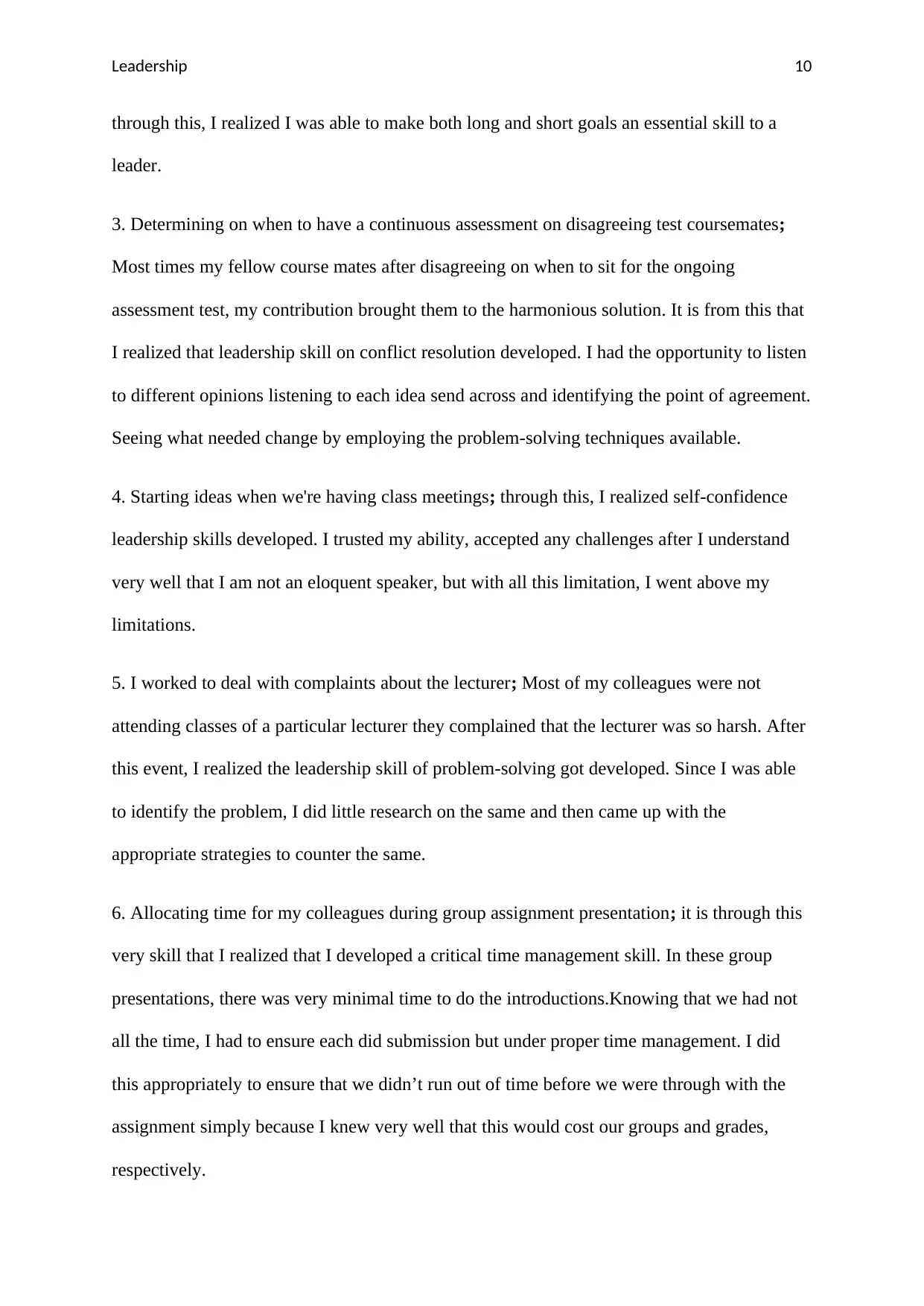
Leadership 10
through this, I realized I was able to make both long and short goals an essential skill to a
leader.
3. Determining on when to have a continuous assessment on disagreeing test coursemates;
Most times my fellow course mates after disagreeing on when to sit for the ongoing
assessment test, my contribution brought them to the harmonious solution. It is from this that
I realized that leadership skill on conflict resolution developed. I had the opportunity to listen
to different opinions listening to each idea send across and identifying the point of agreement.
Seeing what needed change by employing the problem-solving techniques available.
4. Starting ideas when we're having class meetings; through this, I realized self-confidence
leadership skills developed. I trusted my ability, accepted any challenges after I understand
very well that I am not an eloquent speaker, but with all this limitation, I went above my
limitations.
5. I worked to deal with complaints about the lecturer; Most of my colleagues were not
attending classes of a particular lecturer they complained that the lecturer was so harsh. After
this event, I realized the leadership skill of problem-solving got developed. Since I was able
to identify the problem, I did little research on the same and then came up with the
appropriate strategies to counter the same.
6. Allocating time for my colleagues during group assignment presentation; it is through this
very skill that I realized that I developed a critical time management skill. In these group
presentations, there was very minimal time to do the introductions.Knowing that we had not
all the time, I had to ensure each did submission but under proper time management. I did
this appropriately to ensure that we didn’t run out of time before we were through with the
assignment simply because I knew very well that this would cost our groups and grades,
respectively.
through this, I realized I was able to make both long and short goals an essential skill to a
leader.
3. Determining on when to have a continuous assessment on disagreeing test coursemates;
Most times my fellow course mates after disagreeing on when to sit for the ongoing
assessment test, my contribution brought them to the harmonious solution. It is from this that
I realized that leadership skill on conflict resolution developed. I had the opportunity to listen
to different opinions listening to each idea send across and identifying the point of agreement.
Seeing what needed change by employing the problem-solving techniques available.
4. Starting ideas when we're having class meetings; through this, I realized self-confidence
leadership skills developed. I trusted my ability, accepted any challenges after I understand
very well that I am not an eloquent speaker, but with all this limitation, I went above my
limitations.
5. I worked to deal with complaints about the lecturer; Most of my colleagues were not
attending classes of a particular lecturer they complained that the lecturer was so harsh. After
this event, I realized the leadership skill of problem-solving got developed. Since I was able
to identify the problem, I did little research on the same and then came up with the
appropriate strategies to counter the same.
6. Allocating time for my colleagues during group assignment presentation; it is through this
very skill that I realized that I developed a critical time management skill. In these group
presentations, there was very minimal time to do the introductions.Knowing that we had not
all the time, I had to ensure each did submission but under proper time management. I did
this appropriately to ensure that we didn’t run out of time before we were through with the
assignment simply because I knew very well that this would cost our groups and grades,
respectively.
Paraphrase This Document
Need a fresh take? Get an instant paraphrase of this document with our AI Paraphraser
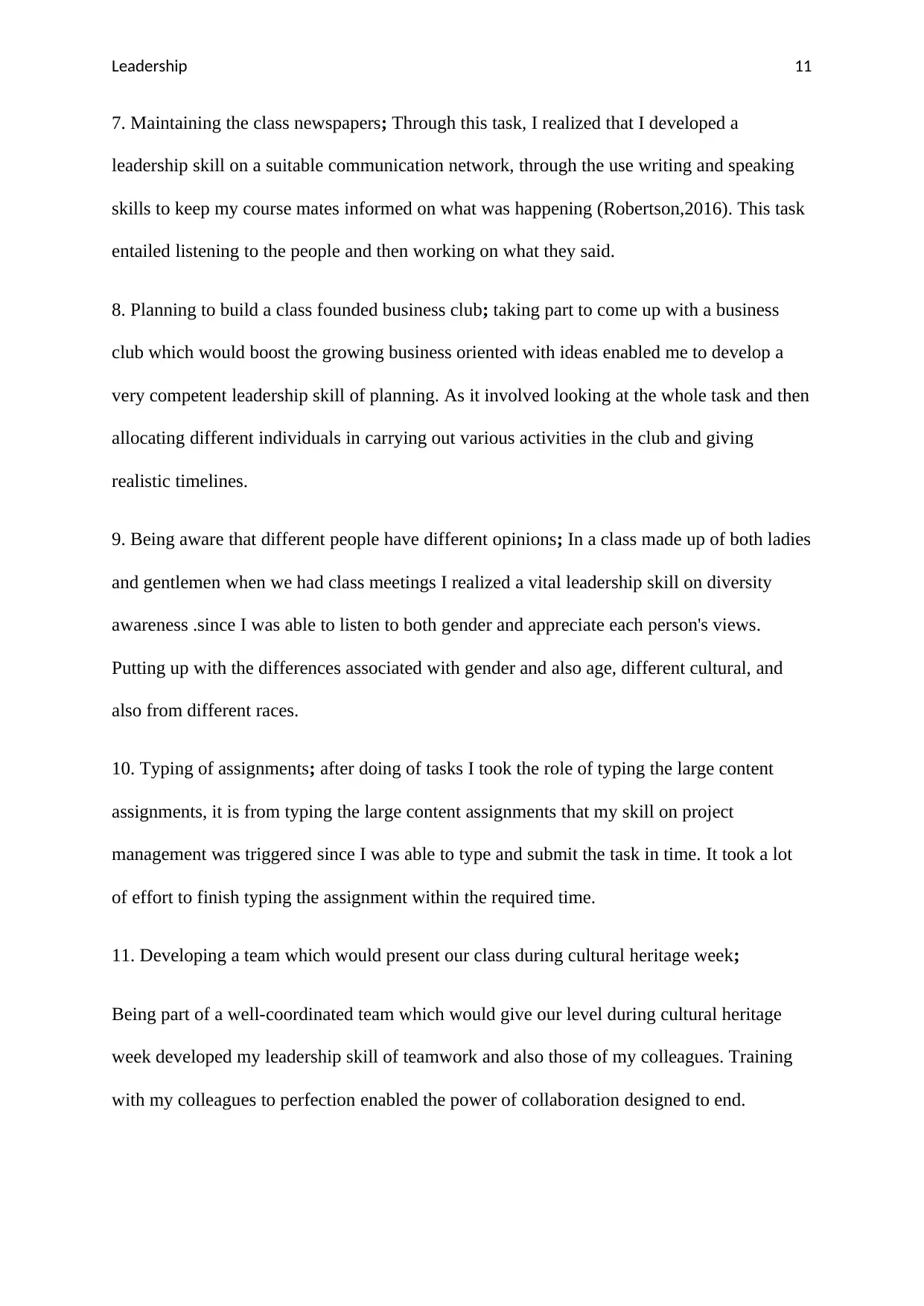
Leadership 11
7. Maintaining the class newspapers; Through this task, I realized that I developed a
leadership skill on a suitable communication network, through the use writing and speaking
skills to keep my course mates informed on what was happening (Robertson,2016). This task
entailed listening to the people and then working on what they said.
8. Planning to build a class founded business club; taking part to come up with a business
club which would boost the growing business oriented with ideas enabled me to develop a
very competent leadership skill of planning. As it involved looking at the whole task and then
allocating different individuals in carrying out various activities in the club and giving
realistic timelines.
9. Being aware that different people have different opinions; In a class made up of both ladies
and gentlemen when we had class meetings I realized a vital leadership skill on diversity
awareness .since I was able to listen to both gender and appreciate each person's views.
Putting up with the differences associated with gender and also age, different cultural, and
also from different races.
10. Typing of assignments; after doing of tasks I took the role of typing the large content
assignments, it is from typing the large content assignments that my skill on project
management was triggered since I was able to type and submit the task in time. It took a lot
of effort to finish typing the assignment within the required time.
11. Developing a team which would present our class during cultural heritage week;
Being part of a well-coordinated team which would give our level during cultural heritage
week developed my leadership skill of teamwork and also those of my colleagues. Training
with my colleagues to perfection enabled the power of collaboration designed to end.
7. Maintaining the class newspapers; Through this task, I realized that I developed a
leadership skill on a suitable communication network, through the use writing and speaking
skills to keep my course mates informed on what was happening (Robertson,2016). This task
entailed listening to the people and then working on what they said.
8. Planning to build a class founded business club; taking part to come up with a business
club which would boost the growing business oriented with ideas enabled me to develop a
very competent leadership skill of planning. As it involved looking at the whole task and then
allocating different individuals in carrying out various activities in the club and giving
realistic timelines.
9. Being aware that different people have different opinions; In a class made up of both ladies
and gentlemen when we had class meetings I realized a vital leadership skill on diversity
awareness .since I was able to listen to both gender and appreciate each person's views.
Putting up with the differences associated with gender and also age, different cultural, and
also from different races.
10. Typing of assignments; after doing of tasks I took the role of typing the large content
assignments, it is from typing the large content assignments that my skill on project
management was triggered since I was able to type and submit the task in time. It took a lot
of effort to finish typing the assignment within the required time.
11. Developing a team which would present our class during cultural heritage week;
Being part of a well-coordinated team which would give our level during cultural heritage
week developed my leadership skill of teamwork and also those of my colleagues. Training
with my colleagues to perfection enabled the power of collaboration designed to end.
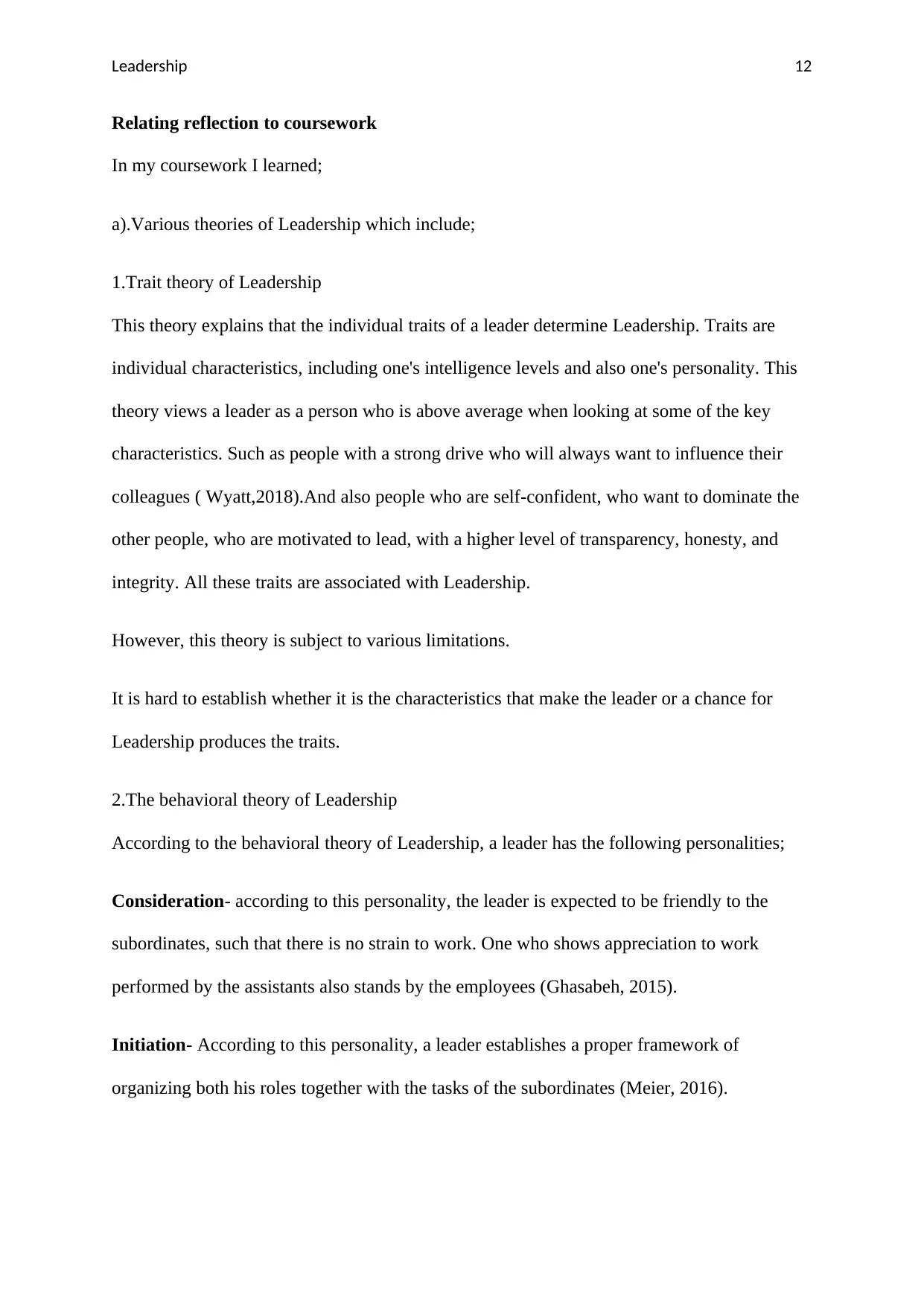
Leadership 12
Relating reflection to coursework
In my coursework I learned;
a).Various theories of Leadership which include;
1.Trait theory of Leadership
This theory explains that the individual traits of a leader determine Leadership. Traits are
individual characteristics, including one's intelligence levels and also one's personality. This
theory views a leader as a person who is above average when looking at some of the key
characteristics. Such as people with a strong drive who will always want to influence their
colleagues ( Wyatt,2018).And also people who are self-confident, who want to dominate the
other people, who are motivated to lead, with a higher level of transparency, honesty, and
integrity. All these traits are associated with Leadership.
However, this theory is subject to various limitations.
It is hard to establish whether it is the characteristics that make the leader or a chance for
Leadership produces the traits.
2.The behavioral theory of Leadership
According to the behavioral theory of Leadership, a leader has the following personalities;
Consideration- according to this personality, the leader is expected to be friendly to the
subordinates, such that there is no strain to work. One who shows appreciation to work
performed by the assistants also stands by the employees (Ghasabeh, 2015).
Initiation- According to this personality, a leader establishes a proper framework of
organizing both his roles together with the tasks of the subordinates (Meier, 2016).
Relating reflection to coursework
In my coursework I learned;
a).Various theories of Leadership which include;
1.Trait theory of Leadership
This theory explains that the individual traits of a leader determine Leadership. Traits are
individual characteristics, including one's intelligence levels and also one's personality. This
theory views a leader as a person who is above average when looking at some of the key
characteristics. Such as people with a strong drive who will always want to influence their
colleagues ( Wyatt,2018).And also people who are self-confident, who want to dominate the
other people, who are motivated to lead, with a higher level of transparency, honesty, and
integrity. All these traits are associated with Leadership.
However, this theory is subject to various limitations.
It is hard to establish whether it is the characteristics that make the leader or a chance for
Leadership produces the traits.
2.The behavioral theory of Leadership
According to the behavioral theory of Leadership, a leader has the following personalities;
Consideration- according to this personality, the leader is expected to be friendly to the
subordinates, such that there is no strain to work. One who shows appreciation to work
performed by the assistants also stands by the employees (Ghasabeh, 2015).
Initiation- According to this personality, a leader establishes a proper framework of
organizing both his roles together with the tasks of the subordinates (Meier, 2016).
⊘ This is a preview!⊘
Do you want full access?
Subscribe today to unlock all pages.

Trusted by 1+ million students worldwide
1 out of 22
Related Documents
Your All-in-One AI-Powered Toolkit for Academic Success.
+13062052269
info@desklib.com
Available 24*7 on WhatsApp / Email
![[object Object]](/_next/static/media/star-bottom.7253800d.svg)
Unlock your academic potential
Copyright © 2020–2026 A2Z Services. All Rights Reserved. Developed and managed by ZUCOL.





